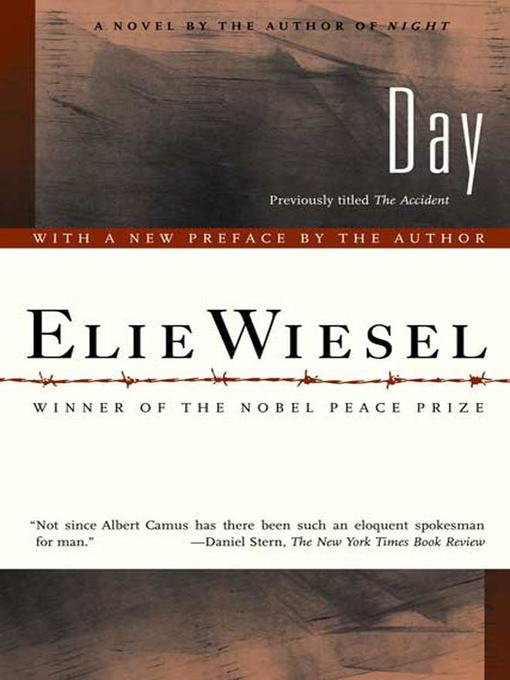"Not since Albert Camus has there been such an eloquent spokesman for man." —The New York Times Book Review
The publication of Day restores Elie Wiesel's original title to the novel initially published in English as The Accident and clearly establishes it as the powerful conclusion to the author's classic trilogy of Holocaust literature, which includes his memoir Night and novel Dawn. "In Night it is the 'I' who speaks," writes Wiesel. "In the other two, it is the 'I' who listens and questions."
In its opening paragraphs, a successful journalist and Holocaust survivor steps off a New York City curb and into the path of an oncoming taxi. Consequently, most of Wiesel's masterful portrayal of one man's exploration of the historical tragedy that befell him, his family, and his people transpires in the thoughts, daydreams, and memories of the novel's narrator. Torn between choosing life or death, Day again and again returns to the guiding questions that inform Wiesel's trilogy: the meaning and worth of surviving the annihilation of a race, the effects of the Holocaust upon the modern character of the Jewish people, and the loss of one's religious faith in the face of mass murder and human extermination.

-
Creators
-
Series
-
Publisher
-
Release date
March 21, 2006 -
Formats
-
Kindle Book
-
OverDrive Read
- ISBN: 9781466821170
-
EPUB ebook
- ISBN: 9781466821170
- File size: 116 KB
-
-
Accessibility
-
Languages
- English
-
Levels
- ATOS Level: 4.4
- Lexile® Measure: 520
- Interest Level: 9-12(UG)
- Text Difficulty: 1-3
Formats
- Kindle Book
- OverDrive Read
- EPUB ebook
subjects
Languages
- English
Levels
- ATOS Level:4.4
- Lexile® Measure:520
- Interest Level:9-12(UG)
- Text Difficulty:1-3
Why is availability limited?
×Availability can change throughout the month based on the library's budget. You can still place a hold on the title, and your hold will be automatically filled as soon as the title is available again.
The Kindle Book format for this title is not supported on:
×Read-along ebook
×The OverDrive Read format of this ebook has professional narration that plays while you read in your browser. Learn more here.